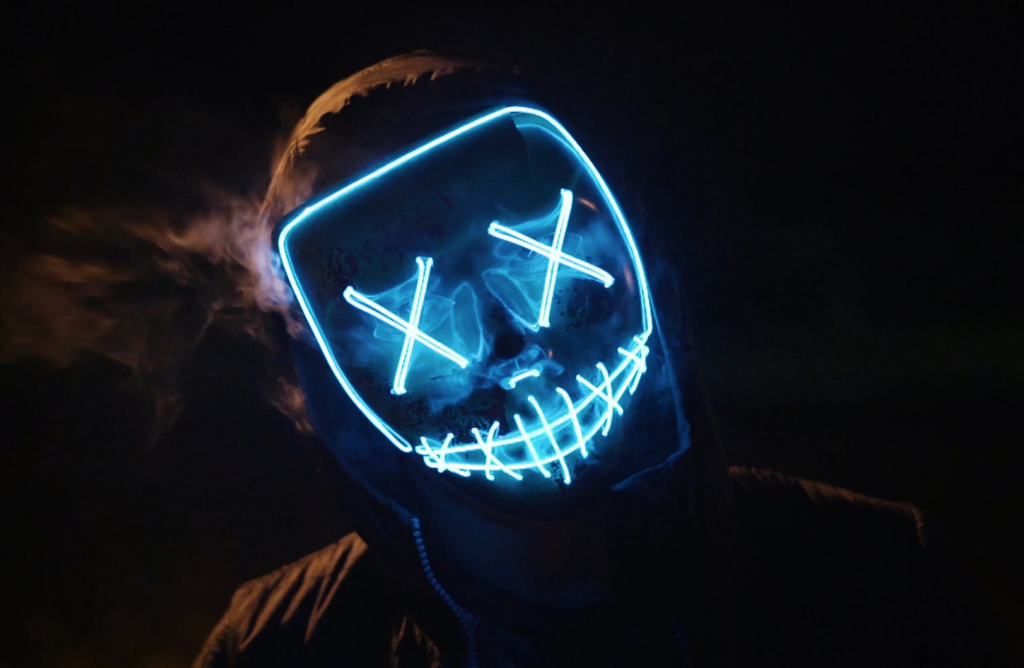
Bad people make better stories. Why? Because I cannot say this enough, ‘Fiction is about one thing and one thing only—PROBLEMS.’
Who better to create a lot of problems than damaged, broken, unlikable, foolish and possibly even unredeemable human beings?
***I use the term ‘human beings’ for all characters because aliens, otherworldly beings, and any ‘thinking’ creature will possess anthropomorphic (human-like) qualities.
So why do ‘bad people’ make better stories?
Perfect people, first of all, are unicorns and don’t exist. Secondly, they are boring. Thirdly, we can’t relate to them because we aren’t unicorns (just deluded we are 😛 ).
What’s the story killer with perfect people? To be blunt, these characters have nowhere to grow. Since ‘perfect people’ handle every crisis with a level head and can be trusted to always do the right thing, the reader won’t ever worry.
If the reader never worries, guess what kiddies? You don’t have a story, you have a lot of words.
Villains are a whole other post. So is the Big Boss Troublemaker (our core antagonist responsible for creating the overall story PROBLEM).
Today, what I want to address is HOW to roughen up our MC and supporting cast in ways that will ratchet tension and drive the character arcs of everyone around.
We need a change agent who will turn pages, without turning off readers.
***Please keep in mind, it is impossible to write a story everyone will love. Knowing this, get in and get dirty.
Bad for the Sake of Bad
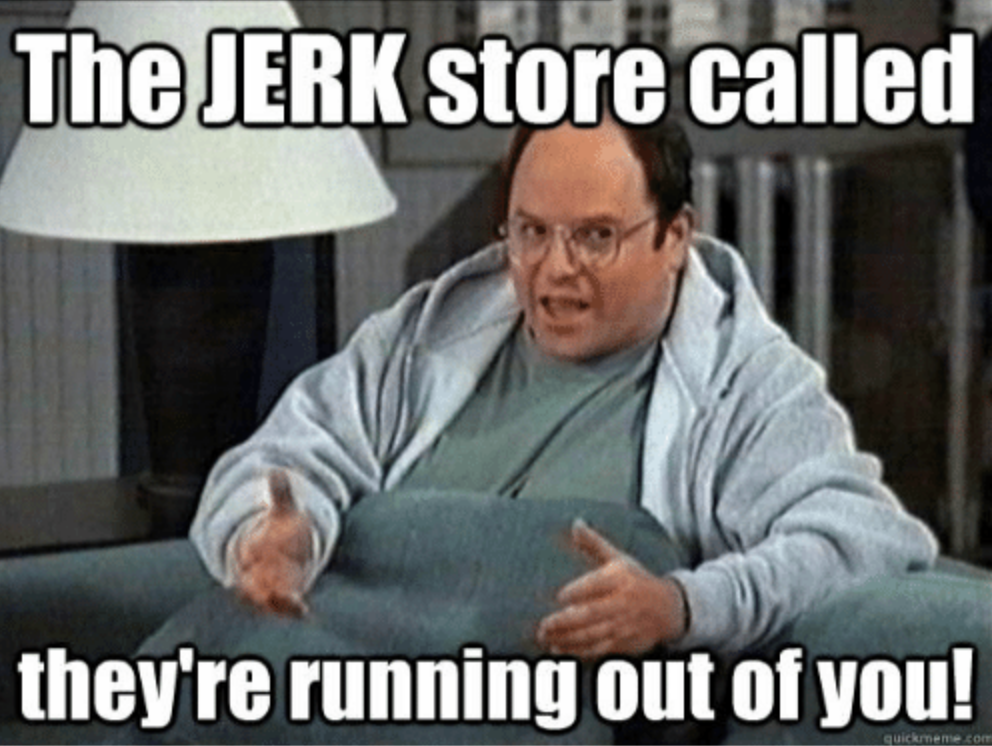
One of the most common mistakes newbie authors make is that they lack the confidence to make any character (who isn’t the villain) flawed at all. From the perfect hair to the perfect outfit, these literary paper dolls do all the right things.
After enough rejection or feedback from critique partners, the emerging writer might start realizing that perfect equals dull.
What then happens is they can go to the other extreme and overcompensate. They create a character so abrasive and awful, readers can’t root for them. Always remember, that artists don’t craft a bad character solely to be bad.
Every character—even a ‘bad’ one—serves a purpose.
There are going to be some possible spoilers in this post, but I’ll work hard to maneuver around that. Usually I strive for older movies and series, but after almost two thousand blogs, I need fresher examples.
‘Bad People’ Make Great Mirrors
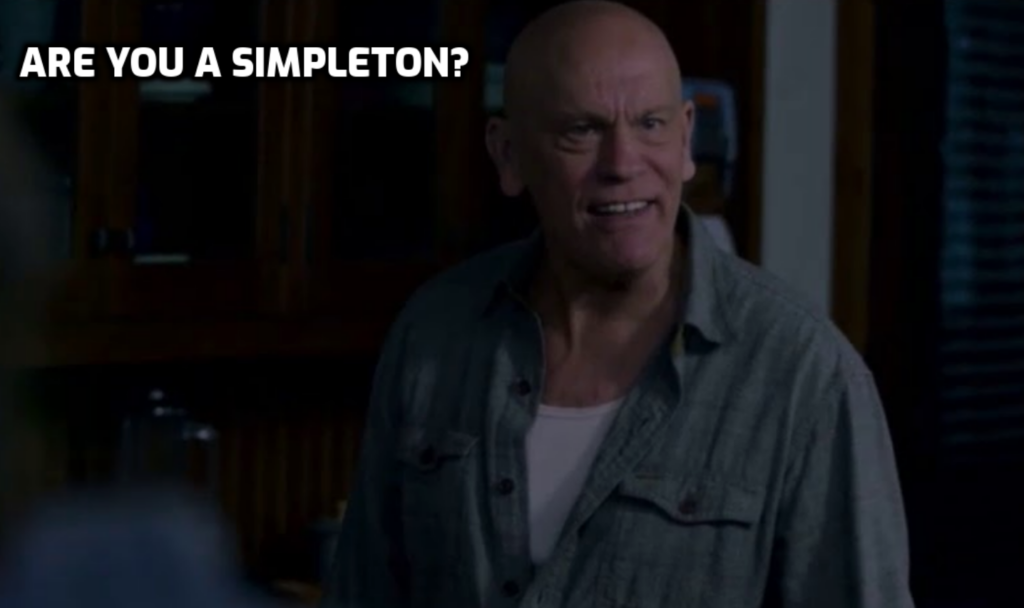
John Malkovich in the Netflix original movie, ‘Bird Box.’
I read Josh Malerman’s novel ‘Bird Box’ and also watched the Netflix original movie. Both versions are excellent. The movie did a fabulous job (which is pretty remarkable in and of itself).
Even though the movie is very different from the book, it did a great job of maintaining the core idea.
***In this post, I’ll refer mostly to the movie version for simplicity.
I mention Bird Box because Douglas was one of my favorite characters. When chaos is unleashed and the world is very literally ending, our MC Malorie has no choice but to take shelter with a group of strangers or die.
Douglas is one of the founding members of this group, and he is not happy to add the very pregnant Malorie to their numbers.
Douglas is rude, selfish, acerbic, and blunt and one of my favorite characters because he is precisely what Malorie needs if she has any hope to survive and evolve. He’s a mirror.
What do mirrors do?
Mirrors show us what IS, not what we want.
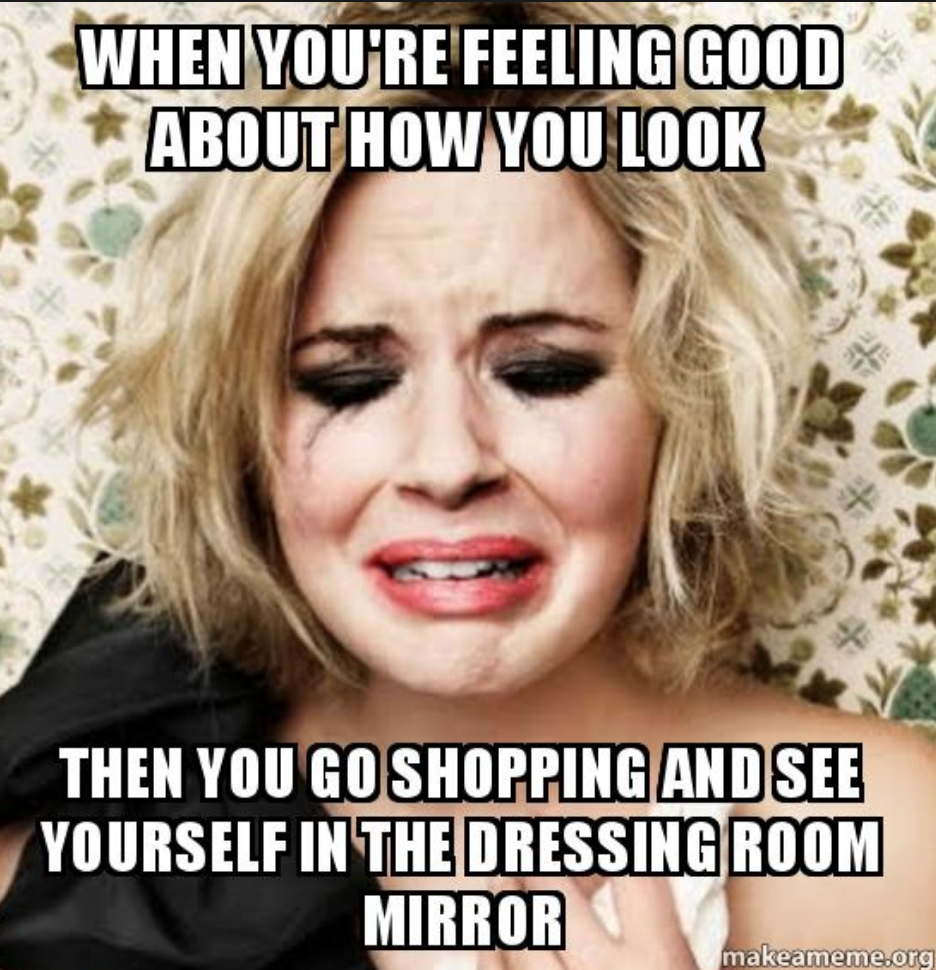
When I look in a mirror, I’d love to see a hot babe with six-pack abs, the legs of a dancer, hair that rivals and an anime character…and flawless, wrinkle-free skin. But this is delusion, not reality.
A mirror shows me what IS. It shows me what’s good—that outfit is BANGIN’! But, it also shows me what I need to work on—maybe lay off the carbs. Ultimately, it shows me what I need to learn to accept and embrace—smile lines are a privilege denied to many.
Douglas minces no words. He doesn’t pretend to be anything other than what he is…a mean bastard who expects the worst and is usually right. Though it isn’t nice to say, Malorie IS soft (in more ways than being pregnant).
She’s been coddled by a modern world she took for granted. Malorie expected her sister to always be there, for her to simply have a doctor and hospital to give birth to a baby she doesn’t want. She’s transitioning into a world where a two-mile trip to get groceries costs lives.
Douglas shows her a new reality she must see if she has any hopes of living longer than a week.
To paraphrase Douglas, there are two kinds of people—@$$holes and the dead. The reason we ‘like’ him is he isn’t wrong. Civility is of zero value when civilization has collapsed.
Douglas also demonstrates a really painful truth.
Not everyone who smiles at you is your friend.
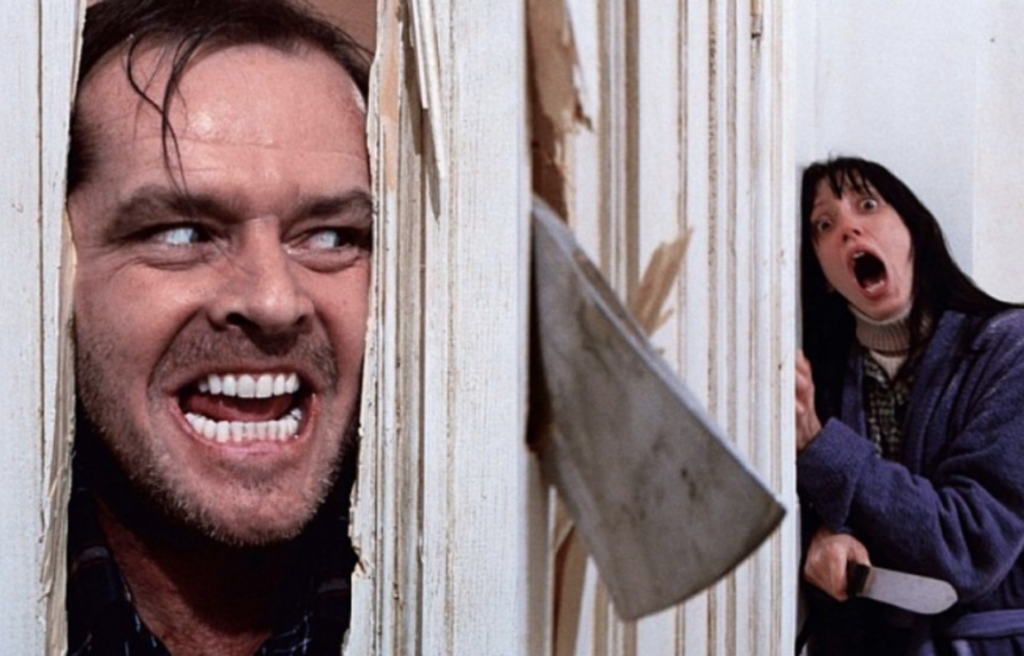
Stephen King’s “The Shining.”
While Douglas is ‘mean,’ he’s so much more than that. He’s a pragmatist, a survivor. According to Douglas it makes no sense to take in every person who begs for shelter, not in a world with limited resources.
It also makes sense to be extremely wary of WHO is allowed into their inner circle. Sometimes you have to make the hard choices for the greater good even if that means leaving a stranger outside to possibly die.
***Time will prove out how right he is.
If the goal is to survive when all hell breaks loose, then choose the party wisely. They no longer have the luxury of making bad choices, and not everyone is who they claim to be.
Douglas is very forthright and honest about who and what he is. He makes no pretense that he’s a miserable S.O.B. Yet, this is a quality that I found endearing.
When lives are at stake, truth is the most precious currency, even if it stinks.
‘Bad People’ Drive Change
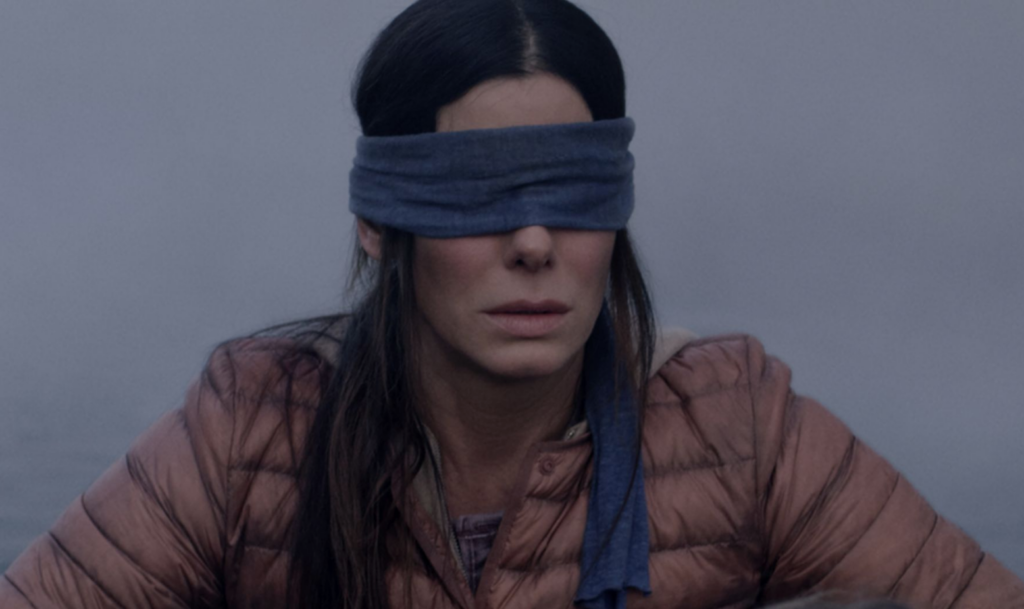
Douglas minces no words about how he feels about Malorie. She is blind long before the blindfolds. She’s weak, soft and a liability. Mirrors show us what’s wrong, what we need to fix. Is our fly down? Do we have the back of our skirt tucked in our underwear?
Is there a giant glob of spinach between our teeth? Has a pigeon pooped in our hair and no one has told us because they ‘didn’t want to embarrass us’?
The mirror might show a lot of what we don’t LIKE, but it offers us the clearest vision of what must change. The same goes for our MC (and all characters if we do our job properly).
In Bird Box, Malorie has to toughen up emotionally and physically to make it through. Yet, at the same time, one of the reasons she doesn’t like Douglas is because he reminds her of her father.
She doesn’t want to be like her father so she’s dismissed any quality her father possessed as ‘bad’ and ‘unwanted.’ The story will show her that the qualities she hated in her father (and in Douglas) are the very attributes that will ensure her survival.
Ah, but what she will ALSO learn (arc) is there is a time and a place for these ‘negative’ qualities.
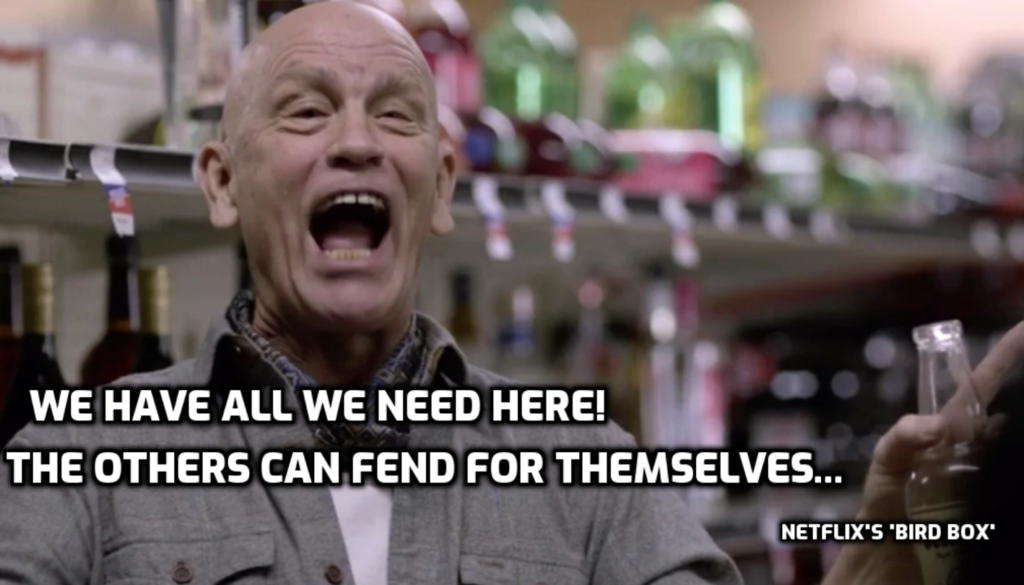
Before the end of the world, Malorie’s dad irreparably damaged his marriage, family, and his two daughters. Even Douglas admits his personality flaws and his drinking cost him two marriages and any meaningful friendships.
What Malorie learns is to not summarily dismiss these attributes as ‘good’ or ‘bad’ because these qualities have a time and a place.
When she’s fighting for survival, she can’t afford to be soft. Paranoia, ‘cruelty,’ emotional distance and a sociopathic level of compartmentalization keep her and those she cares about alive. But, once the storm has passed, the need for these ‘bad’ attributes fades away.
There’s a time to trade the plow for the sword and vice versa.
Should Malorie make it to safety with those in her care and FAIL to put away her father and Douglas’s attitudes and approaches? She’ll be alive, but won’t have a life.
Crafting ‘Bad People’
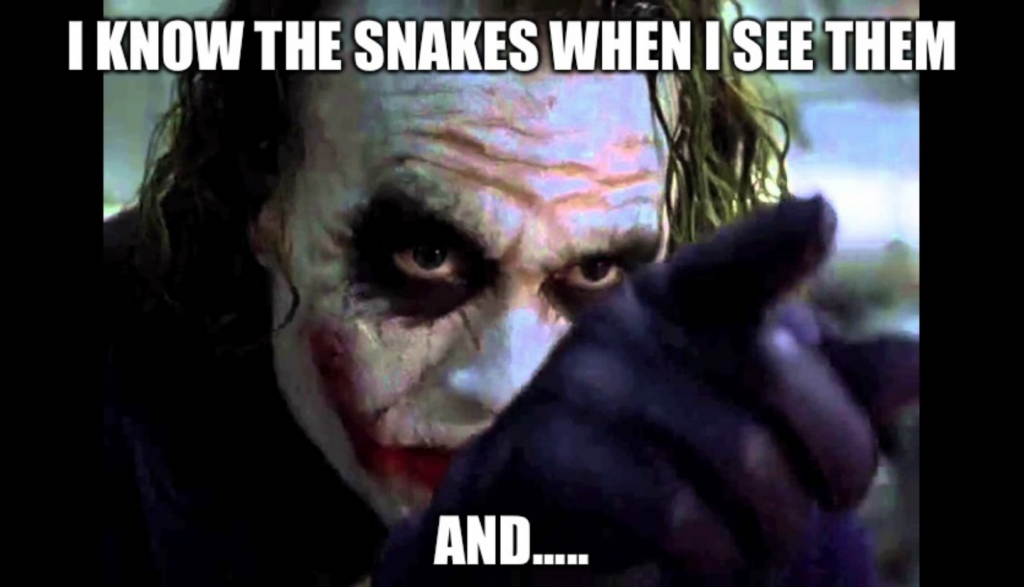
Sometimes, as we just discussed, a character might be ‘bad’ to force change in our MC. What makes Douglas such a fantastic example is that, as awful as he can be? He makes sense. We (readers) can see that he makes very good points.
If they take in too many people, they will starve or increase odds of dying because they’ll have to venture out to resupply more frequently, etc.
When it comes to your story, how can we use ‘bad people’ to strengthen the MC?
What is your MC’s greatest fear? Her greatest shame? What does your MC believe is true, which is, in fact, a lie? A lie that is holding that character back from actualization?
For this, we’ll look to the Netflix series Stranger Things.
If you haven’t seen the series, I strongly recommend it because it’s one of the best examples of superlative storytelling and complex characters I’ve ever seen. I will work diligently not to spoil anything.
In Stranger Things the focus isn’t solely on the lead MC. The party is the protagonist (much like Joy Luck Club, Sisterhood of the Traveling Pants, Lord of the Rings, etc.) and if the party fails, then so will the ‘MC’ Eleven, a.k.a. ‘El.’
What gives SO much depth and texture to this series is the complexity, the interlocking of all the supporting players. In the first season, one of the most interesting characters isn’t even (yet) part of the group of heroes.
Steve Harrington is the ‘popular kid’ trope from every 80s ‘Coming of Age’ movie. He has the great hair, the designer clothes, and drives a Mercedes. He’s a top jock from an upper middle class family surrounded by the standard superficial cronies we’ve seen in countless movies.
Steve is the CLASSIC rich @$$hole.
He’s self-centered, shallow and, ironically…he became one of my favorite characters.
It’s the story problem in Season One that makes him realize he’s shallow and that he’s surrounded himself with counterfeit friends (who are also miserable people). He has to choose between the keeping old him (popular Steve) or let go of that life and pursue Nancy.
Nancy isn’t vapid arm candy like all the other girls he’s dated. When facing the enemy, Steve finally realizes he wants more. The struggle offers clarity about who he’s willing to fight for, and he also learns what true friendship really is.
The transformation in Steve Harrington is nothing short of miraculous.
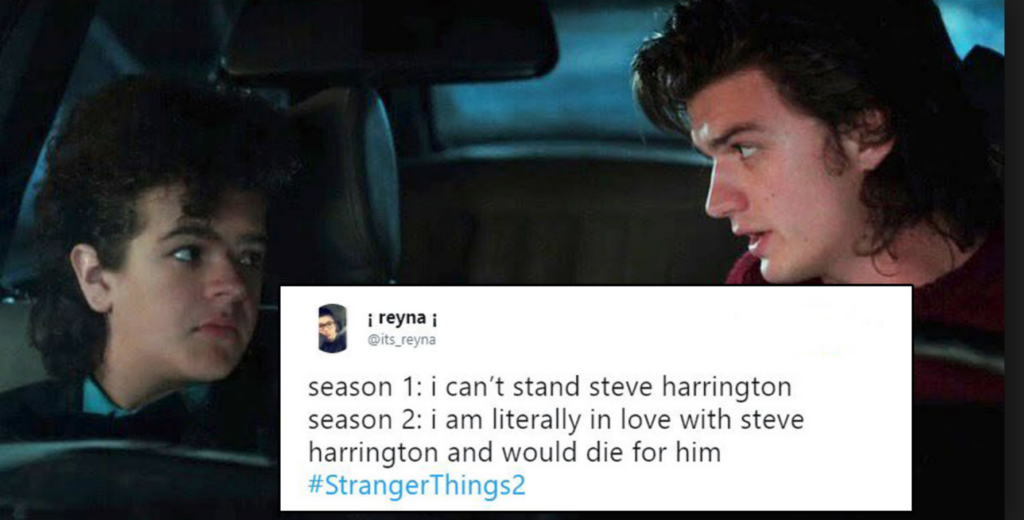
In Season Two, there was a different challenge.
Steve had changed…but not enough. He HAD to grow even more if the group had any hope of surviving Round Two with the enemy.
Steve’s greatest fear is being a nobody and his shame is that deep down, he really believes he has nothing of substance to offer. In Season One, the story problem forced him to see how he used his popularity, money and status as armor.
But what happens when all THAT is stripped away, too? When he can’t rely on being Mr. Cool to keep Nancy? How does he respond to being treated the way he treated others in Season One?
What does Steve DO when HE is the object of ridicule?
Steve can’t ‘level up’ unless he willingly lets go of the ‘old self.’ But, like most of us, Steve isn’t aware of the ‘old self’ and even if he is, it’s comfortable so he’s unlikely to give it up easily.
It will have to be STRIPPED away.
No better way to do this than to bring in a replacement. When the explosive Billy Hargrove screams into the school parking lot in his new Camaro—easily stepping in as the high school’s new Alpha male—Steve undergoes a personal extinction.
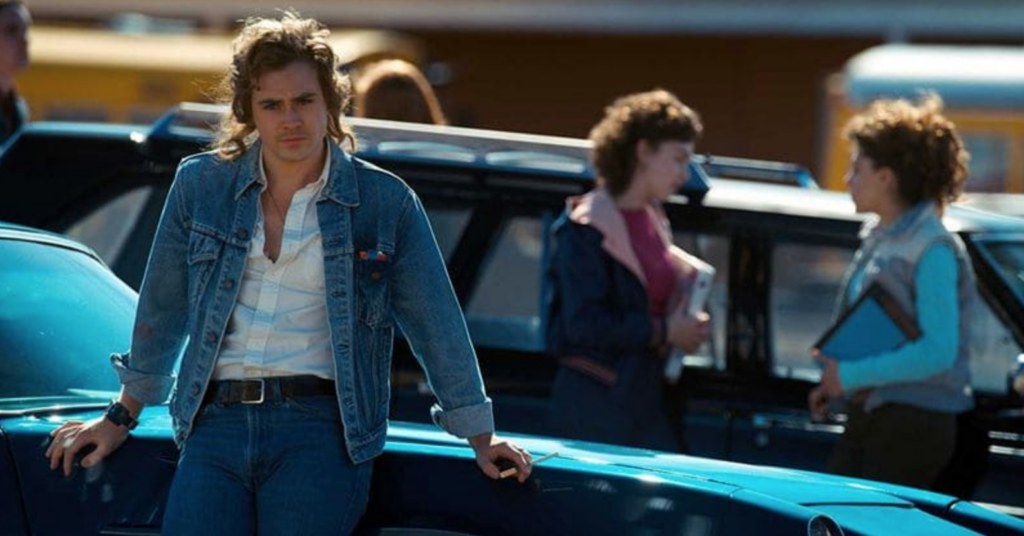
Billy Hargrove ‘Stranger Things’ Season Two.
Not only does he see who he used to be—and have to make peace with that shame—but he also sees what he is not. He’s no longer the strongest, the best, the baddest. This forces him to make hard choices.
‘Bad People’ Force the HARD Choices
Will Steve dedicate himself to fighting to regain the old, or will he evolve to something better? When he’s kicked in the confidence, can he find a better source of courage than great hair and status?
Without the almost sociopathic Billy Hargrove’s influence, it is fairly obvious Steve wouldn’t have a hard enough push required for meaningful change. Steve cannot hope to survive the story problem—the REAL PROBLEM—if he continues to care about that which doesn’t matter.
Billy is a VILE human being (though not without his own baggage and dimension I’m sure we’ll see in Season 3). He’s over the top in everything—his car, hair, clothes, sexuality, and especially his temper (RAGE).
But, Billy HAD to be virtually irredeemable for Steve to even see the message let alone ‘get’ it. Billy strips away Steve’s armor and this means Steve has to become stronger in who he is. If his insides are iron, he won’t need the external protection that can be so easily taken away.
In the End
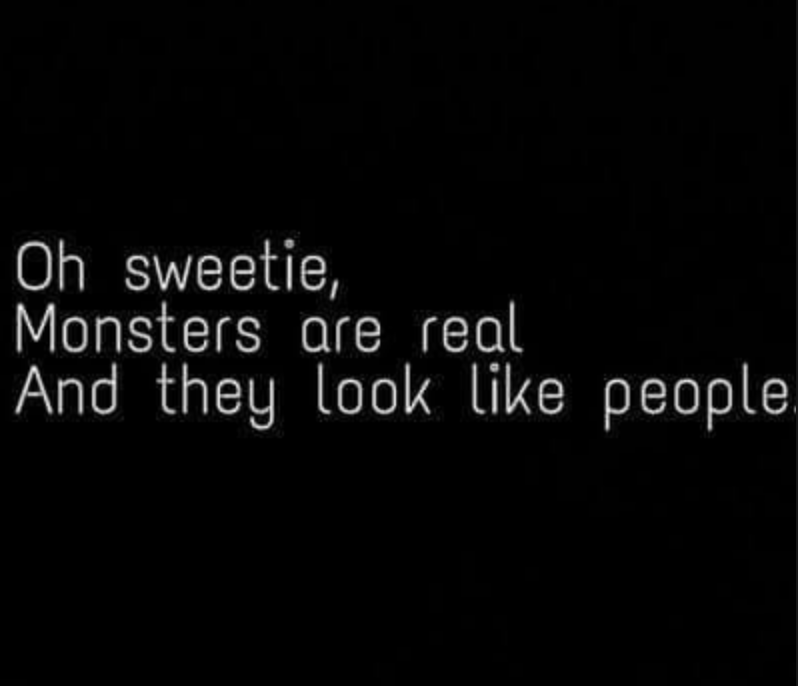
‘Bad people’ make for amazing stories, and this goes for the MC too. If our characters don’t have flaws, weakness, blind spots, and shame, then they’re not ‘real.’ Readers connect with weakness, not strength.
We know pride, envy, fear, estrangement, insecurity, vulnerability, and anger. We’ve all been poseurs, pretenders, and done and said things we wish we hadn’t.
In your story, just make sure these ‘negative’ attributes serve a purpose.
Nothing lives in a great story rent-free.
‘Bad people’ don’t have to arc if they’re not the MC (or part of the protagonist party). Billy is a character that they ‘could’ kill off in Episode One of Season Three. It would be okay because he did his job in Season Two—he forced Steve’s character arc.
I hope they don’t do this because he’s too good of a character to waste. Also, there’s no better story than a redemption story. But, truth be told, it won’t harm the overall story if Billy isn’t in this narrative for the long haul.
It didn’t hurt in the movie Bird Box. Douglas didn’t evolve because he wasn’t supposed to. His purpose was solely to change Malorie.
On the other hand if your ‘bad person’ IS your MC or a major player (part of the group protagonist), then there will have to be something sympathetic/redeemable among all the grit.
We spend most of Season Two loathing Billy Hargrove, but there’s ONE scene that maybe could change some minds about why he’s the way he is and possibly who he could become (good or bad) in the future.
BUT, we’ll have to wait and see.
Suffice to say, all people are ‘bad people.’ Unless we’re a psychopath, we are all very well aware of where we fall short. Most of us struggle with habits, weaknesses and have a laundry list of what we’d like to change, remove or improve.
As authors, when we roughen up our characters, these flaws generate resonance. Personality collisions create the tension that drives the story and forces change in all the players.
Shiny and perfect is all right, but people pay fortunes for items with wear, that are ‘distressed.’ The dings, nicks, and stains show they’ve been through some stuff, have some stories to tell.
Their’ damage’ and ‘wear’ makes them all the more interesting…and valuable. So be bold and go do some damage! Bad people make better stories. If you need some more instruction on HOW to do this…
REMEMBER ON DEMAND CLASSES ON SALE FOR ‘MOTHER’S DAY’!
I have some fabulous classes for sale ON DEMAND ($15 off until midnight MONDAY May 13th). Delivered right to you to enjoy over and over on your computer (pants not required).
To celebrate Mother’s Day, use the code MOM15 for $15 off all ON DEMAND CLASSES. So if you are a mother or have a mother or just appreciate that writing can be a real mother *&^%$ use the code.
These classes won’t be offered again and I’m putting them on sale before deleting them from the hard drive to make room for the new. One of the reasons is these classes started running closer to three hours instead of two because there is so much new material. This means I need to split into two classes or charge more for the extra long class, so this is an EXTRA bargain.
Treat yourself!
ON DEMAND CLASSES
***NOTE: Classes are designed to play on computers (laptops or desktop) and our technology plays nicest with Chrome or Firefox. Many times the recordings are compatible with other devices like tablets or smartphones, but those devices aren’t always able to access the class because of the changes with HTML5. Use mobile devices at your own risk.
On Demand Fiction Addiction: Write the Books Readers CRAVE!
On Demand for a limited time. Watch all you like from comfort of home. $55
On Demand Story Master: From Dream to Done (A.K.A. Fast-Drafting 101)
Yes, you can write a book in two weeks. I’ve done it using what I teach in here. On Demand for a limited time. $55 for basic/$349 for GOLD
On Demand: Harnessing Our Writing Power with THE BLOG!
On Demand for a limited time. $55 Basic/$165 for GOLD








10 comments
5 pings
Skip to comment form
“When she’s fighting for survival, she can’t afford to be soft. Paranoia, ‘cruelty,’ emotional distance and a sociopathic level of compartmentalization keep her and those she cares about alive.”
But can you be paranoid, cruel, emotionally distant and sociopathically compartmentalized and still have people you care about? Or does what you allow yourself to become – for their sake, at least initially – destroy your ability to care about anyone at all?
Author
That’s the point of compartmentalization. Yes. This is what people in Special Forces have to do. There are Navy S.E.A.L.s who are loving husbands and fathers, but they have to flip that switch to do what they have to do to protect those who can’t protect themselves. It’s what anyone trapped in a life or death situation has to do until danger passes. Some people transition better than others. There are those who can be one way for war then switch to ‘peace mode.’ Others?
PTSD is real. Soldiers, survivors of traumatic events like natural disasters or plane crashes, people who break free from being chronically abused deal with PTSD to a certain degree. Compartmentalization is what keeps them alive. But restoring the self to wholeness is work. Some get through (though are obviously changed forever) and others don’t make it.
As for ‘Bird Box’ I was trying not to give any spoilers, but when she does triumph at the end, you see her recognize the time for this emotional distancing is over and she takes the first steps back to being human and building authentic intimacy now that it’s ‘safe.’ But the movie and book make it clear that it’s a process.
I was just wondering how that ‘soldier mentality’ would be affected/different by having the people you love right there in the danger with you. Navy SEALs don’t usually take their kiddies into combat with them, although it would no doubt make for an interesting story if one had to…
Loved every second of this blog. Kudos!
I’ve been working with this concept in the series I’m writing. I have a Grade A SOB as a MMC. Marcus is filthy rich and gorgeous to look at (find David Gandy, he’s my Marcus Lancaster), and yet he is one of the most evil of people. Happens to be a vampire but his evil isn’t just that, he tends to run over everyone, expecting them to do what he wants them to do, no matter what or how.
But Marcus has a few weak spots. He loves the guy who’s been his ghoul for over 200 years. Jessie is a foil for Marcus, he is equally nasty when he doesn’t get his way and they come to a very rough spot in Books 3 & 4. Marcus loves his Chief of Staff at Lancaster Industries (think Blackwater–mercenary masquerading as a security company). Jorge Castro is a father figure to him, even if he’s only a few years “older” (nevermind he’s a 575 year old vampire) and he will listen to Castro’s advice when he wouldn’t hear anyone else. And finally Lancelot, Marcus’s prize champion show Sheltie dog.
Your blog also solved a problem for me, that mirror discussion is exactly what I needed to facilitate a break with someone and Marcus. I’ve been stuck on just how to do that until now.
And yes, you’ll get credited in the acknowledgements. Thanks!!
I read a lot about character arcs, but this hit home for me. So often, the people who get under our skin are revealing truths we’d rather ignore.
This is a brilliant post. I love your analysis of these two characters. Thanks for sharing, Kristen!
I really like that thought: “Readers connect with weakness, not strength.”
In the novel I’m working on, I’ve got one character who has a fearsome reputation but now only wants to be left in peace … however, the self-centered main character unwittingly shatters that peace … and they are both targeted by a devilish character who simply enjoys being mean.
Sort of like the good, the bad, and the ugly. By the way, all three are animals, reflecting human tendencies.
The protagonist is definitely pulling my MC into difficult situations and making her make decisions she’d rather avoid. Their “chats” are getting (dialogue is damn hard) even better he makes her face everything she’s been trying not to think about, (or he will.) In this last revision, things have finally clicked and he’s planting doubts about those that gave her her order/s that she’s caring out. I think he’s her mirror, I’ll have to think about that more as I go over things. ^-^
I still need to develop the good/spirit a bit more he’s going to be even more fun.
As for the other characters that she’s starting to like they are fine.. for now. (Frist I’m fixing the antagonists then them.)
Ya, this is a lot of work but it’s hella’ fun. The problem is cutting down all this stuff so that you don’t have a cast of 100,000 in your first book, chasing after every fun twisty idea? Oh, wait it doesn’t? Well, there goes half the book. Ha-ha writer joke to self. Not funny.
Thanks for making me think. <3
Dang, it Grammarly. Typo: good/spirit should have been: god/spirit
[…] Continue reading HERE […]
[…] you’re developing characters, Kristen Lamb delves into crafting the perfect ‘unlikable’ character, while Piper Bayard discusses backstory: the more I know, the less you have […]
[…] Bad decisions make great stories. […]
[…] This is NOT the 1950s so we have to UP OUR GAME. Bad decisions make for the best of stories. […]
[…] This is NOT the 1950s so we have to UP OUR GAME. Bad decisions make for the best of stories. […]